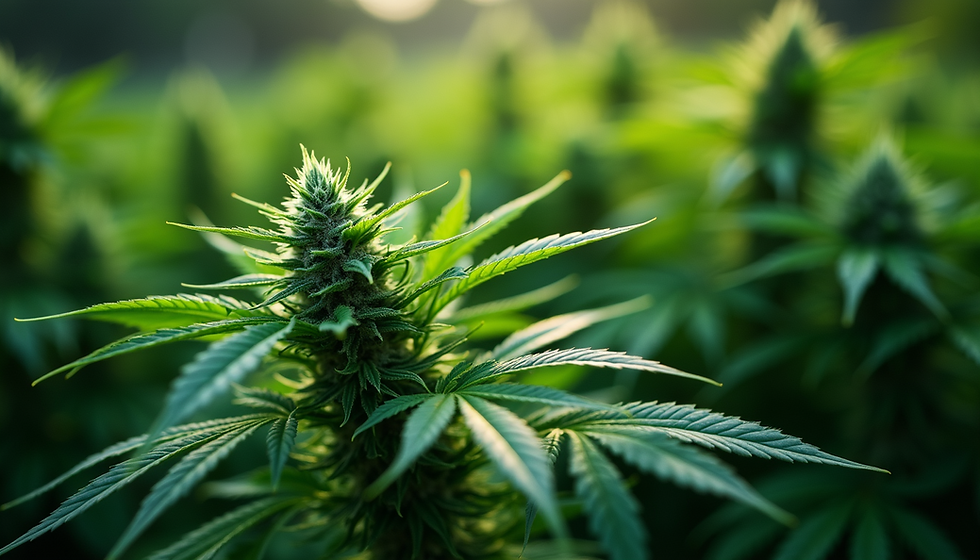The Role of Cannabis in Holistic Medicine: Bridging Ancient Wisdom and Modern Science
- kroncannabistn
- Sep 6, 2024
- 3 min read

Cannabis has been intertwined with holistic medicine for centuries, offering a blend of therapeutic benefits that extend far beyond the realms of conventional medical practices. This ancient plant has found its place in modern holistic therapies, where it is revered not just for its symptomatic relief but also for its deeper healing properties. In this post, we'll explore how cannabis is used in holistic medicine and the potential benefits it holds for achieving overall wellness.
Historical Context of Cannabis in Holistic Practices
The use of cannabis in medicine dates back thousands of years, with its roots in ancient civilizations such as China, India, and Egypt. These cultures recognized cannabis for its ability to treat a variety of ailments and incorporated it into their medical practices as a natural remedy. Traditional Chinese medicine used cannabis seeds to address conditions related to the immune system, sleep disorders, and pain, while in Ayurvedic medicine, it was considered a valuable treatment to lower fevers, induce sleep, and relieve dysentery.
Cannabis in Modern Holistic Health
In today's holistic health landscape, cannabis is celebrated for its versatility and effectiveness, making it a cornerstone of many therapeutic regimens. Here are some key areas where cannabis makes a significant impact:
Pain Management: Cannabis is commonly used to manage pain, especially chronic pain that doesn't respond well to conventional treatments. Its analgesic properties are attributed to cannabinoids like THC and CBD, which interact with the body's endocannabinoid system to reduce pain perception.
Mental Health Support: Cannabis has shown promise in treating various mental health issues, including anxiety, depression, and PTSD. Its calming effects on the brain can help stabilize mood and improve overall mental well-being.
Neurological Health: There is growing evidence to support the use of cannabis in treating neurological conditions such as epilepsy, multiple sclerosis, and Parkinson's disease. CBD, in particular, has been recognized for its neuroprotective properties and ability to reduce the frequency and intensity of seizures.
Anti-Inflammatory Benefits: Cannabis is a potent anti-inflammatory agent, which makes it useful in treating conditions that involve inflammation, such as arthritis, Crohn's disease, and inflammatory bowel disease.
Holistic Cancer Care: Cannabis is increasingly being used as part of integrative cancer care to help manage symptoms related to cancer treatments such as nausea, loss of appetite, and pain. Some studies also suggest that cannabinoids can have anti-tumor effects, although more research is needed in this area.
Integrating Cannabis into Holistic Wellness Routines
For those looking to incorporate cannabis into their holistic health practices, it's important to consider the method of consumption, dosage, and strain type, as these factors can significantly influence the therapeutic outcomes. Consulting with a healthcare provider knowledgeable in both holistic medicine and cannabis is crucial to developing a safe and effective wellness plan.
The Future of Cannabis in Holistic Medicine
As research continues to unfold, the role of cannabis in holistic medicine is expected to expand, potentially offering new and innovative ways to address not just the symptoms but the root causes of many health issues. With its natural properties and wide array of potential health benefits, cannabis stands as a compelling complement to holistic health practices, bridging the gap between ancient herbal traditions and modern medical science.
Conclusion
The integration of cannabis into holistic medicine reflects a broader shift towards more natural, patient-centered approaches to health and wellness. As we continue to explore the depths of its therapeutic potential, cannabis remains a powerful tool in the holistic health arsenal, promising a more balanced and harmonious approach to healing.
Disclaimer: This blog post is for informational purposes only and should not be taken as medical advice. Consult with a healthcare professional before starting any new treatment or therapy.







Comments